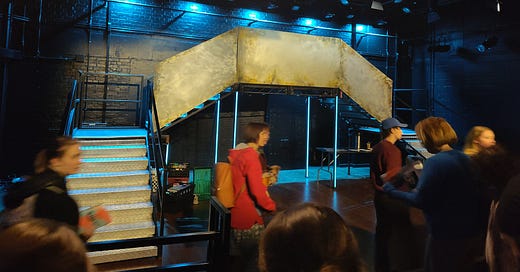The Trojan Women @ Lyric Hammersmith - Review
Raw reflections on polycrisis with a few neat classical references. ★★★★
At the Lyric Theatre, Hammersmith, until 28th September 2024.
Tickets from £10.
Rating: ★★★★
To call this a “reimagining of a classic tale”, as Lyric does, does not do justice to Dipo Baruwa-Etti’s work. This is not your standard re-telling of a classical piece. It barely even resembles The Trojan Women beyond a few character names and themes. It is a unique and original story that playfully reference’s the content and style of Classical drama.
This version of The Trojan Women zooms in on a couple of days in a foodbank, somewhere in Britain, and a catered meeting room, presumably in Westminster. It’s a story of an isolated, protected elite preoccupied with their own comforts, while struggling normal people peristently experience crises and are powerless to stop them. For those of us familiar with the classics, the decade of war in Troy characterised by famine, child death, fire and violence, the comparison to modern day Britain is pessimistic but clever. We share with those ancient people that we are in polycrisis, a state of multiple crises intertwining and magnifying one another, sometimes feeling apocalyptic. Baruwa-Etti makes use of characters from the original to varying extents: Cassandra is borrowed wholesale, a prophet who is not believed; Helen’s name and beauty are used, but her helplessness swapped for calculated puppetry of a stupid man; the rest are largely unrecognizeable. Other cultural baggage is also borrowed, the Prime Minister is called Merlin, a goodhearted insider named Potter (unavoidably evoking Harry).
The style sits somewhere between classical and Shakespearean, with occasional rhyme and clever workplay but no fixed meter. This very charming style is sometimes dropped for more naturalistic dialogue, which is less effective and breaks the flow. There are light allusions to the chorus at times, which could be further highlighted.
Thematically, the interesting but effective choice has been made not to make this a story of women living through problems caused by men, as was the tale Euripides told. Our main antagonist is a woman, Helen, and while the audience is briefly teased with suggestions that she’s treated unfairly becuase of this, she does come off as worse than the man in power. The foodbank is entirely female staffed, but this is not reflected on, and a conflict between a man and woman in their perceptions of crisis does not come down to gender.
While this is a performance as part of a training scheme, the acting is largely very high quality. Áine McNamara plays a fantasticly convincing Riley, a naive and aspirational volunteer at the foodbank, with a realistic, emotive style. Samuel Glyde-Rees’s portrayal of Merlin, the stupid and comically evil PM, is sitcom worthy, careful balancing farcical comedy with just enough realism. Aneeza Salina Ahmed’s acting is not always convincing during routine dialogue, but at crucial points she packs the most impressive emotional punch of the cast, her portrayal of Andra, a pregnant foodbank user, and her sincere hope for her child’s future was enough to make me cry.
The staging is minimalistic but effective, a metal arch provides a metaphorical way to stage the elite against underclass while also providing a platform for very inventive AV usage. Unfortunately, haze is really overused in this performance, the stage is constantly a bit smokey which adds little to the feel while making this inaccessible to people with a multitude of medical conditions. The costuming is also effective, simple modern dress, and avoids stereotypes of poverty that no longer make sense in the fast fashion era.
While not a great use of source material, this version of The Trojan Women is a fantastic and timely show, well acted and set. It is a beautiful piece of original theatre that I hope to see refined and restaged without Euripides’ baggage soon.
You might also like:
Polycrisis:
Loosely classical:
Community & Resistance:












